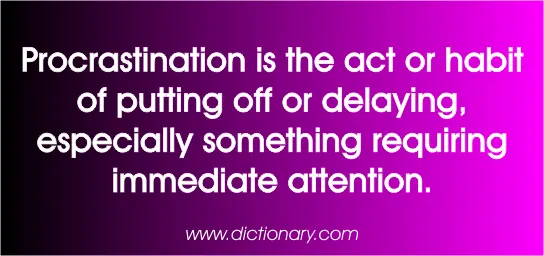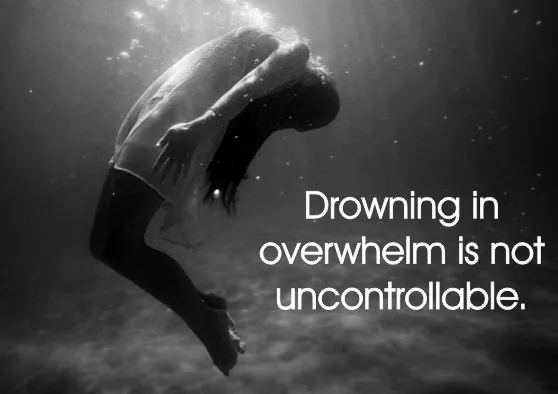Procrastination
You have probably heard this maxim a thousand times: procrastination is the thief of time; some people even started reciting it long before they knew the meaning of procrastination. There are lots of theories on why people procrastinate; this post will focus on “overwhelm” using a typical example.

If you procrastinate often, don’t worry, you are not alone. A lot of people procrastinate to some degree—a lot—just that some are chronic procrastinators, the ones who don’t get things done until the eleventh hour. Or, they find it hard to complete projects, especially projects with no deadlines. Thus, they forfeit rewards. They lose clients. Sometimes they feel like failures.
Andy, a web developer, has a four-week deadline to complete a web app project. It has to be built from scratch. It’s something Andy is capable of doing; in fact, he’s very skilled. He estimates it would take two weeks to complete the project.
On day two, in the morning, he sits in front of his computer to start. But at the same time he thinks of other things he wants to get done:
- write a post for his tech blog
- complete his personal web app project
- reply emails
- call a client to discuss about some updates he needs to make
- design a logo
And a ton of other things. Basically, he has an undoable to-do list. He also wants to win his ex-girlfriend back even though she already has a new boyfriend. He gets stressed, overwhelmed. Negative thoughts creep into his mind:
“Andy you don’t have enough time.” “Andy you don’t have the energy to do all these things.” “You can’t handle all these things.”
He feels “paralyzed.” There is anxiety and fear. He flees to totally avoid the negative effects of overwhelm by procrastinating, seeking an activiity that's more pleasurable like watching a video online. It's not just because of the overwhelming amount of things he wants to get done, but because of the brain's reflexive flight (or fight) response to negative experiences.
The cylce continues. He blinks and the first week is gone, then the second, and then the third. He has only completed about five percent of the project, and he can’t really figure out why. It kind of feels like twenty-four hours isn’t enough.
But he can’t afford to disappoint because there’s a lot to lose. His reputation is at stake. He spends the last seven days labouring day and night. It’s very stressful and could have been totally avoided.
Or Andy sits in front of the computer to start the project. Then he thinks of the amount of code he would have to write and the many things he would have to do before he completes the project. He gets overwhelmed without even starting. He decides to switch to a video sharing platform to watch a tutorial on how to build a mining rig, convincing himself that it’s also equally important since he’s learning, and possibly spends several hours watching different tutorials.
He only puts in more time into the project when panic mode is activated, when the deadline is close. He may even miss the deadline and disappoint the client.
Overwhelm is basically when there are great amounts of something that it becomes hard to deal with.

Source
He can overcome procrastination triggered by overwhelm by:
Prioritizing things he wants to do. It’s simple. He writes out all he wants to achieve for the day. Then he rearranges the list and places the important tasks above the less important once. After, he strikes out things he has no control over - like winning his girlfriend back: it would be on the list every day, and there is little he can do to make it happen. Even if it’s something he can achieve, there’s no use worrying or thinking about it while he has more important things to do.
Would something like, “Check photos on social media” be on the list? Not advisable. It could reduce his willingness to go back to the important tasks.
Building the web app may not necessarily be at the top of the list because there may be other things which are equally important—but more urgent. So, he gets those things done first.
Okay, Andy now has a list of the things he wants to get done, arranged according to how important and urgent they are. The next step is for Andy to decide how long he wants to spend on each task. More time may be allocated to writing posts for the blog than working on the web app for that day. The next day, he may spend more time working on the web app. And on another day it may be his personal web app project that he spends more time working on.
After checking a task off the list, it’s always a good idea to take short breaks before beginning another. He could take a short walk, meditate, or basically engage in activities that further his goals.
Splitting big tasks into smaller tasks. Andy has the list, and he knows how much time he wants to spend on each task. Let’s assume his plan for the first day working on the web app is to create its database, he could further breakdown creating the database into twelve small tasks.
We hardly get overwhelmed when we do things like update our status on social media, then switch to an instant messaging app to reply a friend’s text or view their status because these activities are easy. And we hardly leave them unfinished. Why would you type a status like “Just lost a tooth” and decide not to tap on the “Post” button because you’re tired or something. It takes less than thirty seconds to type and post.
When tasks are broken into little pieces, checking the first, second, third … little task off a list would feel as easy as updating your status. It’s not as exhausting as tackling the whole “big” to-do at once. Each time a piece of the main task is completed, there's satisfaction, it feels great, there's motivation to continue.

Source
Next time you get overwhelmed while working on something important, don’t let yourself slip into avoiding getting things done by procrastinating. Stop and ask yourself why you are getting overwhelmed. It may feel like your head wants to blow up, but it’s totally within your control to overcome.
Click on the coin to join our Discord Chat

Witness proposal is here: https://steemit.com/witness-category/@adsactly-witness/adsactly-steemit-witness-proposal
In the bottom of the page type: adsactly-witness and press vote.

Use small letters and no "@" sign. Or, click here to vote directly!
Thank you!
